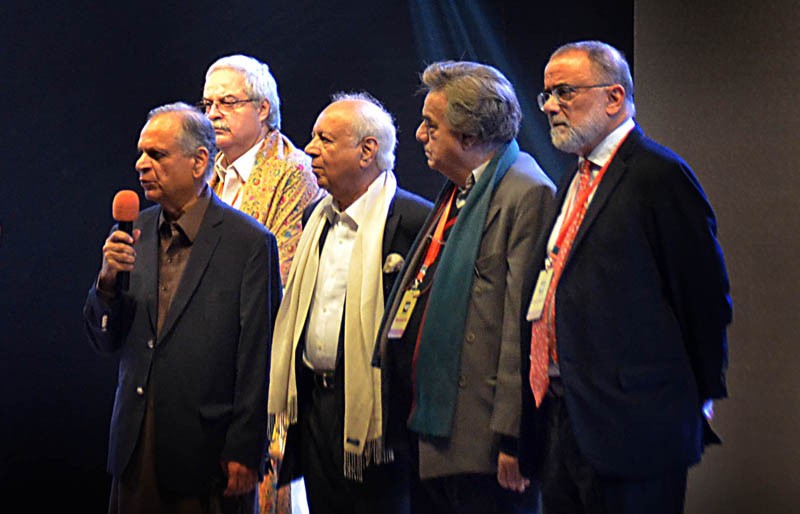

The glossy Lahore Literary Festival brought some pleasure to the reading public, a mix of excitement and jitters to the speakers, a landing-place to aimless wanderers and entertainment to the so-called ‘Westernised’ elite. This year’s edition brought in its wake some dreadful anxiety for the organisers who weren’t sure if they would be able to go ahead with the festival or not.
Despite a curtailed schedule and last-minute venue change, the festival did attract a huge and eager crowd. The hotel lobby had turned into a drawing room for idle chatter, the halls were filled to capacity, the gardens, the corridors and the staircases utterly flooded by men, women and children of all ages.
The absence of two literary giants Initizar Husain and Abdullah Hussein, whom we lost in the last one year, was strongly felt since they were very much a part of LLF 2015.
A session dedicated to Qurratulain Hyder’s Aag Ka Darya featured Ameena Saiyid, Arifa Syeda Zahra, Zehra Nigah and Asif Farrukhi was moderated by Masood Ashar. The discussion veered off from the novel that spans two and a half millennia to Hyder’s person. Asif Farrukhi narrated a compelling incident. He said "Ainee Appa who chose to remain single was often labelled by fellow authors for having an incomplete personality". Farrukhi authored a column defending her decision not to get married. He was approached by an angry Hyder who told him off for writing that column. He responded "but I have written that in your favour" to which Hyder retorted "I am not bothered about the three Ms: Male, Muslim, Middle Class".
Towards the end of day one, some middle-aged men were spotted sitting in the lounge singing songs from Sharmila Tagore films. One of them asked if Tagore was coming back to the festival? "We are waiting since morning. We would only leave after meeting her," one of them said.
In a session titled "Lurching Rightwards: South Asia in the Balance" politician Sherry Rehman shared the stage with Bangladeshi scholar Dina Siddiqi and former Foreign Secretary India, Salman Haider. The moderator for the discussion was Kamal Munir, dean of Humanities & Social Sciences at LUMS. The panel dealt with religious fundamentalism, hyper-nationalism and dispersion of leftists from the South Asian region.
Sherry Rehman who was highly critical of Prime Minister Narendra Modi’s government said that India was making trend lines not headlines. Did anyone hear of the fact that four people were killed in Kashmir? Had it been in the streets of Pakistan it would have become a headline, she said. "People will resist and that is happening on campuses in India. In Pakistan and Bangladesh too the civil society is protesting in the public spaces. The promises and slogans raised by the left regarding good governance, social inclusion and redistribution of property have been adopted by the right wing parties," expressed Rehman. A middle-aged man from the audience commented that in 1974, Zulfikar Ali Bhutto introduced a constitutional amendment declaring Ahmadis to be non-Muslims. He asked if Rehman thought PM Modi’s policies could be compared with that of ZAB. A round of applause followed while Sherry Rehman, shocked at the question, instantly responded "You want to compare ZAB to Modi! What are you guys smoking these days?"
Read also: ‘Love Letters’ comes to Lahore
The last session ‘Midnight’s Grandchildren: South Asia’s English Poetry Post-Independence’ was a conversation between Sudeep Sen and Ryan Van Winkle. Sen, the Indian poet, mesmerised the audiences with his captivating poetry. He talked about his passions, aspirations, challenges and experiences as a poet. He told how he once got love struck by a dazzling dancer performing on stage in India before he wrote the poem titled "Bharatnatyam Dancer". "She was much older than me but I proposed to her; in fact, I have proposed to many women. I am a happy man," he exclaimed laughing.
Day two concluded at night with a play -- A.R. Gurney’s Love Letters featuring Imran Aslam and Rehana Saigol -- and qawali by Fariduddin Ayaz. The much awaited literary fiesta thus came to a hasty end, leaving people craving for more.